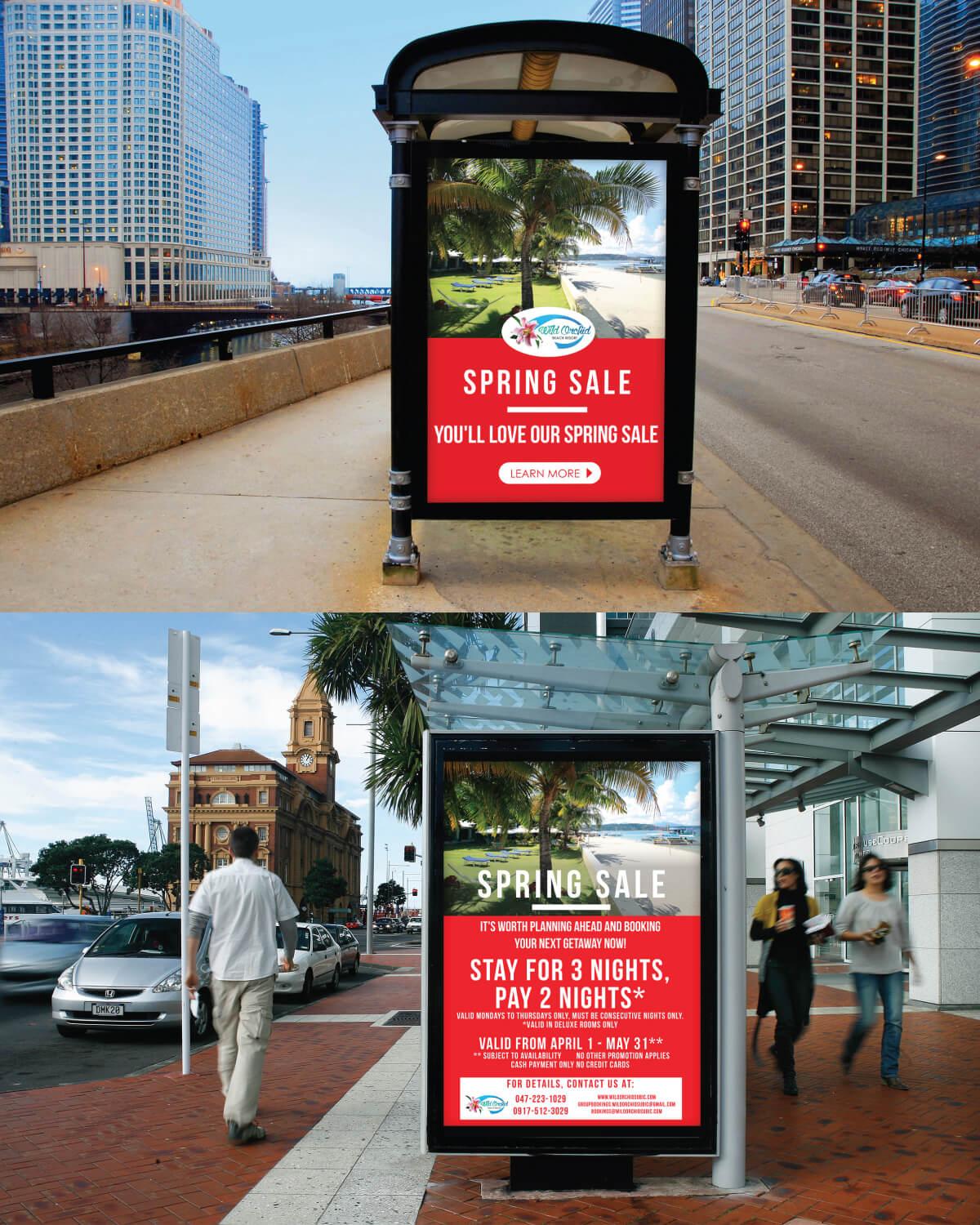
 Eye Tracking in 2016: How Searchers Interact with Mobile SERPs vs. Desktop
Eye Tracking in 2016: How Searchers Interact with Mobile SERPs vs. Desktop
In 2014, Mediative released an eye-tracking study that looked at how Google’s Search Engine Results Page (SERP) has changed over the last decade, and how searcher behavior has adapted as a result. We learned that:
1. Top organic results are no longer always in the top-left corner, so users look elsewhere to find them.
2. Mobile devices have habitually conditioned searchers to scan vertically more than horizontally. Searchers are looking for the fastest path to the desired content.
3. People are viewing more search results listings during a single session and spending less time viewing each one.
4. Businesses that are positioned lower on the SERP (especially positions 2–4) see more click activity than they did several years ago, making this real estate much more valuable.
5. The #1 organic listing still captures the most click activity (32.8%), regardless of what new elements are presented.
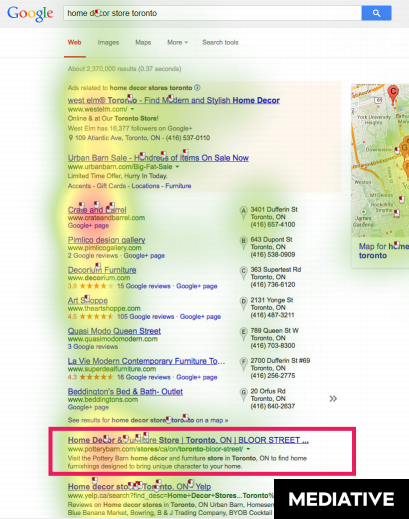
On a desktop, the #1 organic listing is shifting further down the page, opening up the top of the page with more potential areas for businesses to achieve visibility.
The way website listings are presented on a mobile search engine results page is significantly different from how they're presented on a desktop. The decrease in available screen size means there are a limited number of listings immediately visible to searchers, and competition for the top spots can be fierce.
In this latest eye-tracking study, Mediative took 49 participants of mixed age and gender, asking them to complete 41 search tasks on an iPhone 5 using Google. We used the X2-60 Tobii mobile device eye tracker to track where they looked on the screen, measuring time to first look, how many participants looked, and how many participants clicked on each listing.

The Tobii X2-60
An example of one of the tasks we asked? "You’re interested in taking a vacation to New Orleans. Use Google to find cheap flights from Toronto to New Orleans." Participants were shown the mobile SERP below:
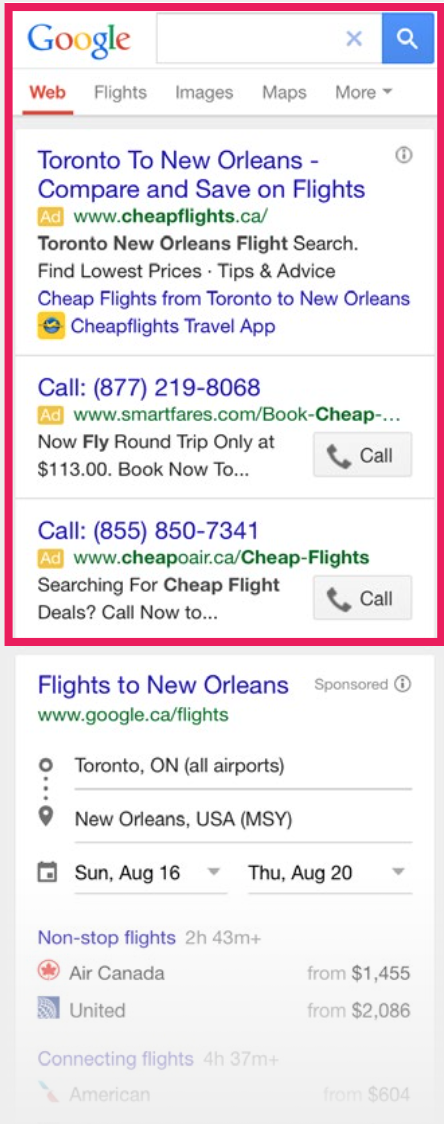
The area highlighted in the image above shows what's viewable on the mobile screen, before scrolling is necessary.
Ultimately, we wanted to know:
1. Where on the mobile SERP do searchers look and click the most? How does this differ from desktop searchers?
2. How important is the location of a listing on the SERP to win views and clicks from searchers?
3. Does the need for scrolling negatively or positively impact the views and clicks that listings further down the page receive?
4. What can advertisers do to ensure their Google listings are seen and clicked on a mobile SERP?
Key findings:
1. The #1 organic listing still captures the most click activity; it just takes 87% longer for it to be first seen on a mobile compared to a desktop.
In cases such as the one shown below, the knowledge panel that appears to the right of the results on a desktop (left image) becomes a key feature at the top of the mobile SERP (right image). Searchers have to scroll in order to see the organic listings that can be seen without scrolling on a desktop. This didn’t deter searchers from seeking out the top organic listing, however — it just took longer.
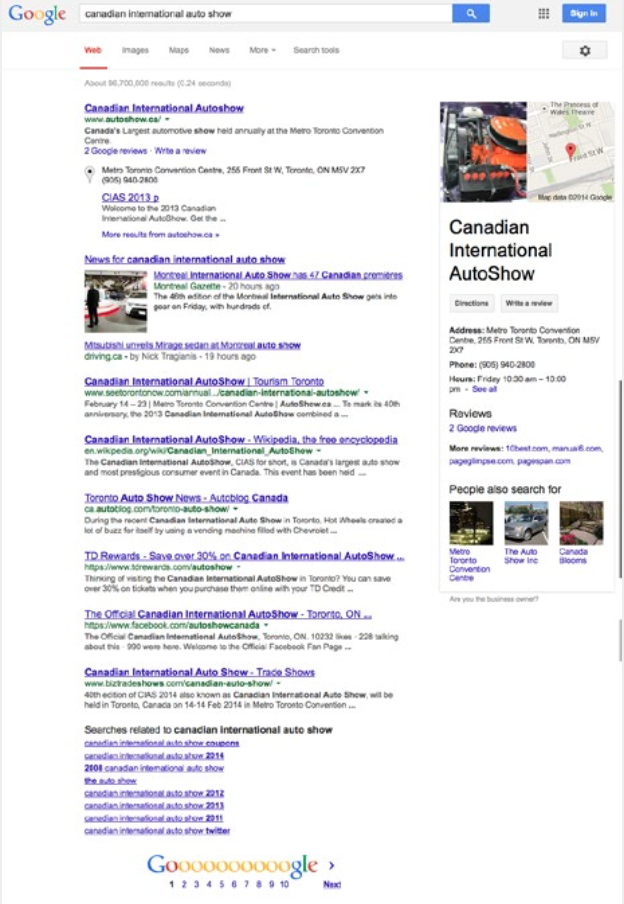
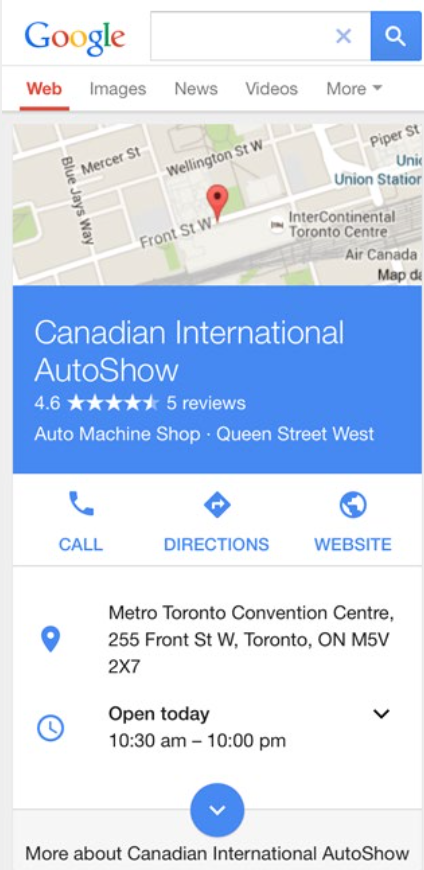
Takeaway:
The relevancy of your listing to the searcher's intent becomes more important than ever as it’s taking longer for people to first lay eyes on the organic listing. This provides more of an opportunity for them to be distracted by other brands and features on the SERP that appear before the organic listings.
2. Only 7.4% of clicks were below the 4th organic listing versus 16% on a desktop, and only 62.9% of tasks resulted in a scroll-down.
Takeaway:
Being above the 4th organic listing — whether in an organic, local, knowledge graph, paid position, etc — is critical. Fewer and fewer clicks are going to listings below the top 4 organic listings, leaving less opportunity for advertisers to drive traffic to their sites.
Mobile SEO needs to be taken extremely seriously. However, many businesses don't realize the importance of optimizing their sites specifically for mobile, resulting in ranking lower on a mobile than on a desktop.
- Invest in putting as much relevant content into your SERP listing and use available tools such as Schema to ensure that your listing stands out on the screen, increasing the likelihood of capturing clicks.
- Take advantage of the fact that other elements are presented above the organic listings, where over 35% of the page clicks on mobile were won.
- Track mobile rankings separately so as to optimize specifically for mobile, depending on the results that are seen.
Tips to rank higher in the mobile SERPs:
- If you have an app, ensure it's indexed. More and more, apps are going to be competing with websites for rankings and traffic.
- Remember you're dealing with a reduced space, so ensure your most important information is at the very beginning of page titles and descriptions, including priority keywords in the body of the website content.
- Websites with Accelerated Mobile Pages (AMP) might result in higher rankings. Although not confirmed by Google, the company did reiterate the importance of page speed and the need to improve page load times, of which AMP is one way to achieve this.
3. 11% more clicks went to the knowledge graph on a mobile phone compared to a desktop, and almost 22% less clicks went to the top #1 organic listing on a mobile compared to a desktop.

A heat map showing the views captured by a knowledge graph result on a mobile phone. The displayed knowledge graph is shown to the right.
The introduction of more elements at the top of the page requires significant scrolling before the lower organic listings are reached, and these additional elements took a portion of clicks away from the top organic listings in that time.
When we studied mobile SERPS that only included organic listings, we found that:
- 99% of people looked at the top organic listing vs. 83% on a desktop
- 40% of page clicks were to the top organic listing vs. 34% on a desktop
- 75% of page clicks were to the top 4 organic listings vs. 60% on a desktop
When we studied mobile SERPS that also included paid listings, local listings, a knowledge graph, etc, we found that:
- 78.5% of people looked at the top organic listing vs. 99% on organic-only pages
- 33.2% of page clicks were to the top organic listing vs. 40% on organic-only pages
- 57% of page clicks were to the top 4 organic listings vs. 75% on organic-only pages
Takeaway:
Features on the mobile SERP such as the knowledge graph results have the potential to capture a significant amount of attention away from the organic listings. The major difference between a knowledge graph on a desktop versus a mobile phone is that scrolling is required on a phone to see organic listings. Once again, the importance of a strong mobile SEO strategy cannot be understated. If you find your organic listing is losing too many clicks to the knowledge graph, find other keywords that don't produce the knowledge graph and include them in your optimization strategy.
4. The top sponsored ad is seen by 91% of searchers.
Takeaway:
Mobile screen real estate is extremely valuable. You have two ways to try and earn as much of that real estate as you can: paid search and mobile SEO. Although paid search can't guarantee that you'll always appear at the top of the results, a good paid search campaign can definitely help capture more clicks.
Consider paid text ads if you’re looking to improve website traffic, or optimize for local searches if appropriate, rather than focusing all efforts on ranking #1 in the organic listings. As three paid ads on mobile become more common, brands must be prepared to see a drop in traffic from organic listings, and perhaps consider increasing their investments in paid search.
5. 19.2% of page clicks on average went to the top 2 sponsored text ads, compared to 14.5% on a desktop.
Takeaway:
Paid search represents a bigger opportunity for traffic to your site on a mobile compared to desktop, especially if ad extensions are present.
Tips for using paid search ad extensions to push organic listings from view:
- Location extensions ensure the business address is shown alongside the ad.
- Call extensions add the ability to call the business directly from the paid ad.
- App extensions show a link below the ad text that allows people to download your app
- Site link extensions add links to various website pages from within the ad.
- Call-out extensions add descriptive text to your ad to describe more about what you do or offer.
6. 47% more clicks went to the map and local listings when they were above the organic listings.
Takeaway:
The positioning of the local listings, whether below or above the organic listings, can have a significant impact on the views and clicks captured by each of the local listings or the organic listings. With only three local listings appearing on mobile, it’s important for your business to be there, especially if your website is struggling to rank in the top 4 organic listings.
Tips to rank in the local listings and capture more clicks:
- Have a complete and accurate Google+ page for every location. Focus on the number of citations and NAP accuracy across third-party sites and local directories.
- Get reviews! The stars in the listing only appear once 5 reviews have been generated
- Ensure your site is full of locally relevant, useful content, with plenty of local keywords used throughout
Measure more than just clicks. Clicks to a local listing from a mobile device can result in a reduction in traffic to the brand's website, as the local listings link to the Local Finder. It's therefore important to measure impression data from local listings as well as traffic to business Google+ pages, as this can contribute to driving traffic to local stores and businesses.
To conclude
There’s no doubt about it: being listed at the top of the SERP is critical on a mobile device. People may scroll up and down, but ultimately, with over 92% of clicks going to an area above the 4th organic listing, if your business listing is below that, you’re almost invisible on a mobile search. Mobile must be taken seriously, but there are still far too many businesses that don't see that importance and are still focusing all their efforts on desktop.

 Blogger’s Grammar Blues: What Really Matters
Blogger’s Grammar Blues: What Really Matters
But often, when we mention grammar, the grammar guardians will always mean correct grammar. Someone might ask: Is there a different kind of grammar?
I believe there are as many grammars (or ways of writing in any language) as there are people. For example, Americans love to add the word “thingy” to every word they cannot recall or for any thing they do not know how to call – such as the pointed “thingy” that the pope wears during high mass or the green “thingy” you add to soy sauce to make a dip for sashimi.
So, who decides what correct grammar is or should be? Shakespeare? The English professors at Oxford or Harvard? My retired English professor-friend? Or the latest book on grammar from Amazon?
Grammar has rules or laws. But who made them in the first place?
Imagine the first human who ever spoke. Did he have a teacher? I suppose he had. Did his teacher teach him grammar? If by grammar we mean proper construction of words to form intelligible sentences that carry sensible or meaningful words, he must have for he had the best teacher of all time and eternity!
Reading the Bible (or any classic work) is one of the best ways to learn grammar. In fact, it has been the best way for centuries since many of the translators, particularly of the old King James Version published in 1611, were linguistic scholars who were contemporaries of Shakespeare (who may have been one of the translators) and were proficient in English as well as in Hebrew, Greek, and Latin. And remember, the last four hundred years gave us many excellent writers and leaders who grew up reading God speak in King James’ English: Twain, Dickens, Verne, Steinbeck, Lincoln, Darwin, and Livingstone, among others!
That reminds me of a country – Japan or China, I cannot recall – where some adults are taught to speak English by listening, singing and studying the popular songs of the Beatles. Not a bad idea actually as the Four Fab did speak Her Majesty’s English. Until, of course, they learned from the Americans and picked up some of the bad grammar. “One and one and one is three.” Here come them ol’ grammar cops come together with their batons flying in the air!
But we all know King James English is passé – not bad grammar, only outrageous conjugations. But if so, why do people still enjoy watching Shakespearean plays? I would venture to say it is not the grammar they are after but the sense of style and flair words are spoken. It is the passion in words, not the words themselves that matter. Rap music is popular because of that very reason. So is rock music and almost every kind of music, including grammar-less, sometimes senseless dance music. The beat in the spoken words energizes the heart to heights of rapturous flight!
But someone would say, “That is spoken language!” What about serious, written language we read online? Oh yeah? Did anyone ever really hear Shakespeare or his characters speak? We used the Bible and Shakespeare to prove that the written word can and do possess life and passion and truth.
We must write then to enhance life and all that is possible in it. The “thou”, “doth not” and “be still” may have given way to “yo”, “da’n’t” and “hush”; but the essence and purpose of grammar remain: clear and understandable sentences.
In the end, it is the message, news or story that matters. As long as the majority of people get the meaning, the grammar matters less. Good grammar may lift us high to fits of ecstasy as that balcony scene from Romeo and Juliet does to any hopeless romantic; but love is intoxicating enough without grammar getting into the picture. The words, spun masterfully by the bard, and flowing effortlessly from lovers entranced by each other’s beauty and each other’s surplus of words is the pinnacle of what human potential is all about.
Words can make us fall into endless love. And, conversely, love can make us fall endlessly into words and words and words. In short, we can fall in love with words and with perfect grammar. The dangers of Babel’s pride remains alive and confusion can arise from any writer who loses the fundamental goal of language.
So who really needs good grammar? If we could write like a poet every time we post a blog or a tweet, we would all be writers aware of the power of language and of the human potential for which we were destined. Meaning would flood our lives and no tweet would ever be wasted on the fly. Adam, the first language user for many of us, did clearly understand his destiny until the serpent twisted it with the use of “seductive” language. The grammar was good as well; but the purpose was evil.
There it is: While grammar is essential; it is the ultimate intention we use it for that matters. No matter how good or perfect our language may be if people are deceived or made to suffer, the truly wise among us would rather choose to use five “well-spoken words” -- even in poor grammar – as long as we lead people along the right path.
Grammar is the basic technical requirement for good, acceptable language. But “well-spoken words”, though they violate grammar rules, will never violate any law. Grammar must pay homage to the higher, intangible standards of life, love and, well, language as well.
Article adapted from Search Engine Journal.
ABOUT LGO
LGO offers prompt and excellent writing services such as web-content building, link building, project feasibility and development studies, online marketing campaigns and press releases.
For more information, please contact LGO’s friendly representatives at this email address – webmasters@logicgateone.com

 Online Reputation Management
Online Reputation Management
MORE THAN POSITIVE REP.
Web Reputation Management (Online Identity Management / Personal Branding)
An owner understands that his business’ public image means everything -- you could lose partners, employees, and customers with a negative one. Just look at companies which neglected their reputation for some time. Can't find one? Precisely!
And even if you're not a multinational corporation or a large-scale manufacturer of soda, you can still have a business so an overview of reputation management is in order. It might not be a mainstream yet but this sector is gaining attention as people and businesses shift the venue of interaction to the online world.
Your reputation in the real world is not enough.
If it's true that your real world reputation will eventually translate into the online world, then it follows that having a stellar rep IRL will fix its online counterpart, right? Not quite. You could do everything right with your business in the real world but without being aware of social media and the risks online, you're a sitting duck.

 Submissions
Submissions
Directories are quite simply the online version of those quintessential yellow pages, where you can find almost everything listed down and categorized. While there are free ones, others require a fee before your business could be submitted. Choosing the right categories to be included in getting your places because LGO doesn't do those fully-automated submission services (Why would you entrust your details and reputation to unsupervised codes?) we can get through the human-edited directories.
We can also put your business on the map quite literally. Your office address and business contact will be right there on the map. Aside from the bonus that potential clients will easily spot you, this also counts significantly in the SEO meter.
By the way, we also do article and video submissions.
Customer support service by UserEcho
